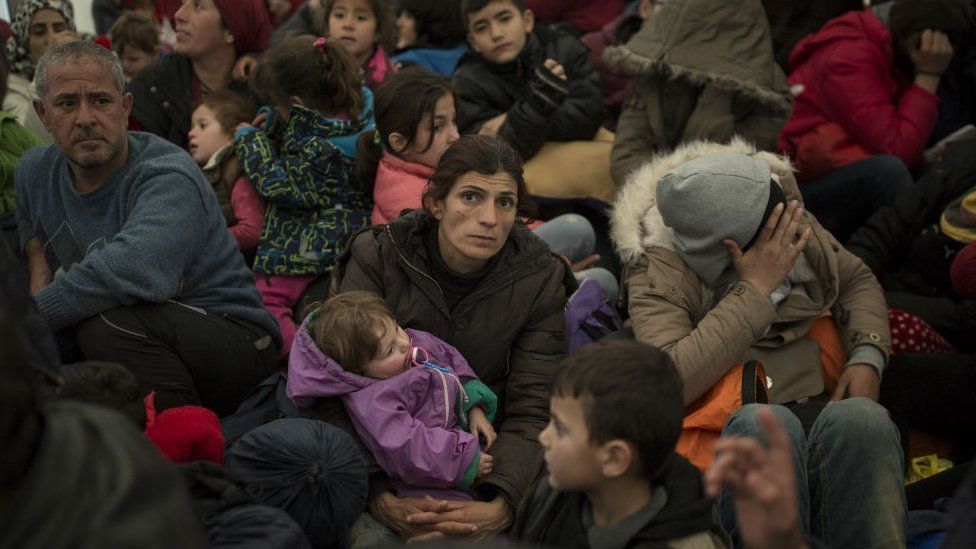Migrant crisis: Asylum seekers in EU 'doubled in 2015'
- Published

The number of people seeking asylum in the European Union in 2015 reached 1,255,600 - more than double that of the previous year, new figures suggest.
Syrians, Iraqis and Afghans topped the list of applicants, with more than a third going to Germany, Eurostat says.
Thousands more migrants are arriving in Greece from Turkey every day.
More than 10,000 are now stranded in northern Greece on the border with Macedonia, as EU countries have re-imposed internal border controls.
At a news conference with German Chancellor Angela Merkel in Paris, French President Francois Hollande said migrants had to stay in neighbouring countries. He also vowed continued support for Turkey.
Speaking after talks with Turkish President Recep Tayyip Erdogan in Ankara, European Council president Donald Tusk said that, for the first time, a "European consensus" was emerging over how to handle the migrant crisis.
Mr Tusk - who is on a diplomatic tour ahead of an EU-Turkey summit on Monday - also said he had been told by Mr Erdogan that Turkey was ready to take back all migrants apprehended in Turkish waters.
The EU on Friday also announced the first payments of a €3bn ($3.3bn; £2.3bn) package aimed at helping Turkey cope with migrants on its soil.
The head of the EU's delegation to Turkey, Hansjorg Haber, said a large amount of the money would be spent on humanitarian aid, followed by schooling and infrastructure for migrants.
Some €400,000 had already been disbursed, Mr Haber said.
The Turkish government says that it has spent €8bn on Syrian refugees.
On Thursday, Mr Tusk issued a warning to illegal economic migrants not to try to reach Europe,
He also proposed "a fast and large-scale mechanism to ship back irregular migrants" arriving in Greece.
Turkey, which is already hosting 2.5 million migrants, has been reluctant to readmit those who have managed to reach the EU.
Sending people back to Turkey is also problematic for the EU.
International law forbids returns of asylum seekers to countries if there is a risk of death or persecution there. Only one EU country - Bulgaria - considers Turkey "safe", the European Commission says.
However, an EU-Turkey action plan agreed last October says those who do not qualify for international protection - that is, economic migrants - can and should be sent back. It takes time however to determine genuine asylum claims.
The EU is offering incentives to Turkey: visa-free travel for Turkish citizens in the passport-free Schengen zone; a new determination to proceed with Turkey's EU membership bid; and €3bn in extra aid for refugees hosted by Turkey.
Internal border controls introduced by eight EU countries to stop the flow of migrants and refugees have strained the Schengen agreement.
On Friday, the European Commission unveiled a proposal to restore a fully-functioning border-free area by the end of the year.
Among the measures, it says countries must stop the "wave-through" procedure of allowing migrants to move from one country to another, along with support for external border controls, particularly for Greece.
The International Organization for Migration says 120,369 migrants have arrived in Greece from Turkey so far this year and at least 321 have died en route.
A note on terminology: The BBC uses the term migrant to refer to all people on the move who have yet to complete the legal process of claiming asylum. This group includes people fleeing war-torn countries such as Syria, who are likely to be granted refugee status, as well as people who are seeking jobs and better lives, who governments are likely to rule are economic migrants.